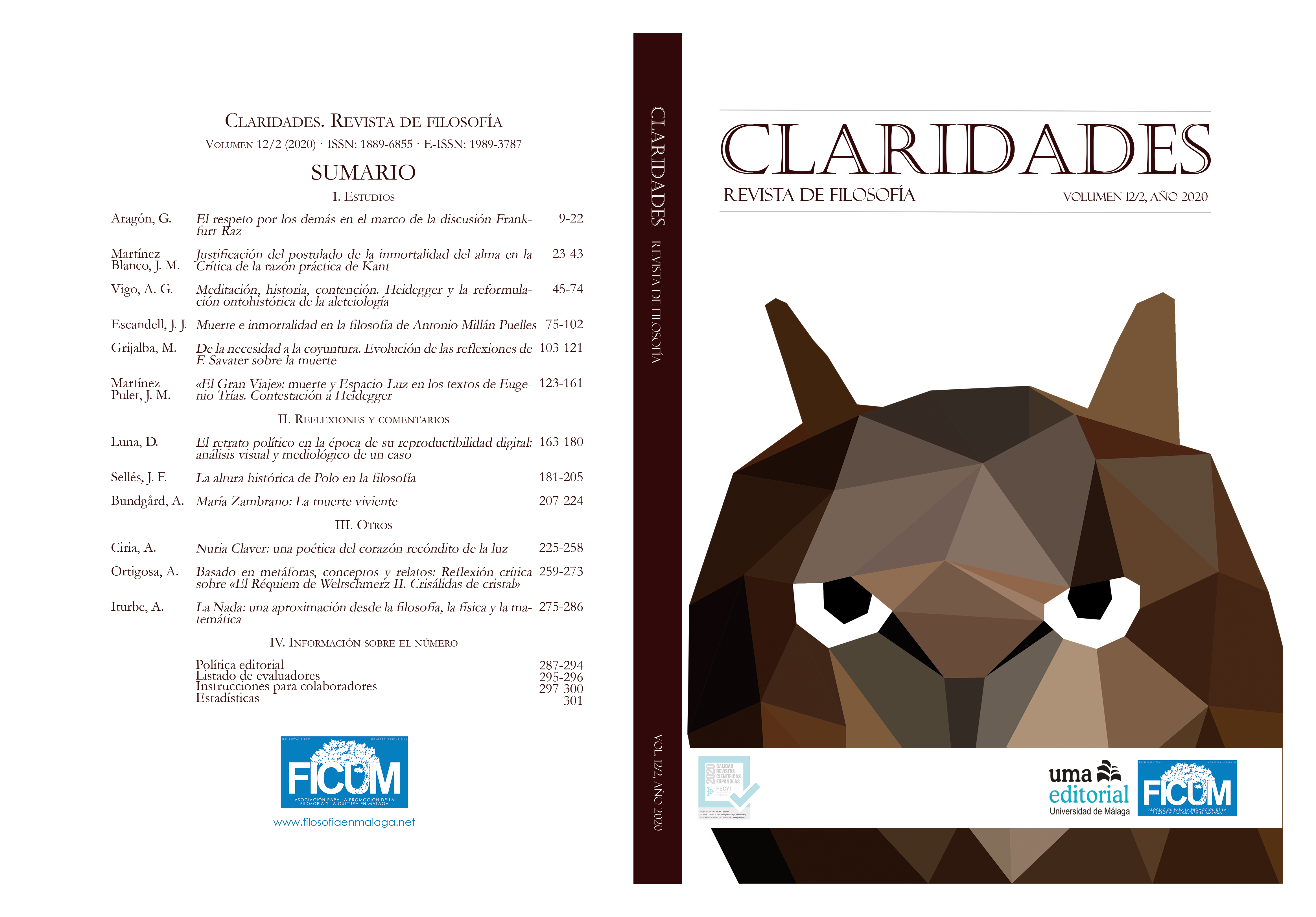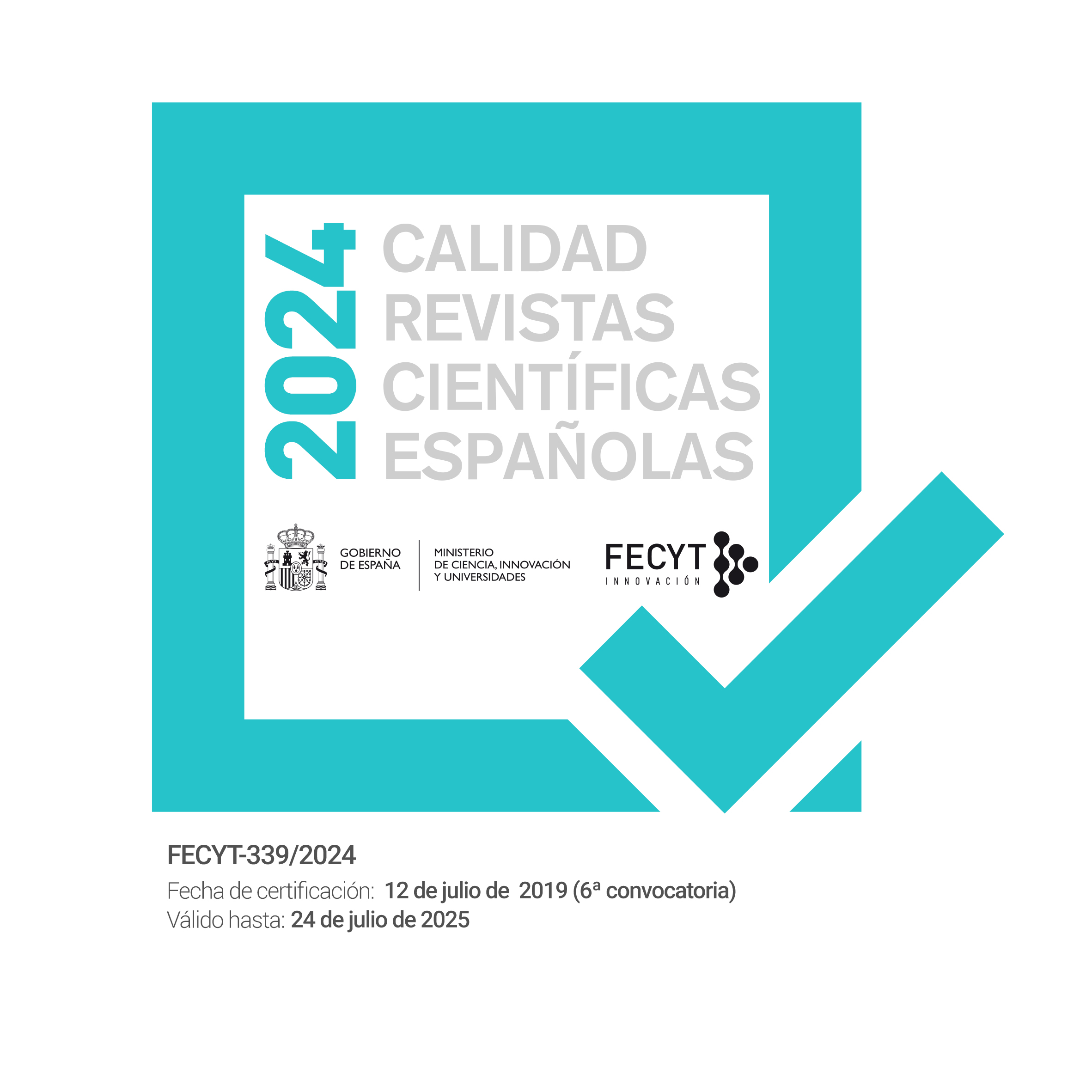Meditation, history, containment
Heidegger and the ontohistorical reformulation of aletheiology
DOI:
https://doi.org/10.24310/Claridadescrf.v12i2.6680Keywords:
Alehteiology, kairology, history of being, enowning, restraintAbstract
This essay presents an overview of the way in which the «turn» (Kehre) towards ontohistorical thought, in the mid-30s, impacts on the aletheiological conception that, following E. Lask and E. Husserl, Heidegger elaborates from the beginning of the 1920s to Sein und Zeit. On this basis, an attempt is also made to characterize the eventualist-kairological reformulation of aletheiology presented in Beiträge zur Philosophie. The proposed characterization is carried out according to the distinction between a metahistorical level of consideration, which corresponds to the attempt to think of being in its truth in terms of the notion of «event» (Ereignis), and a properly historical level of consideration, which corresponds to the «hermeneutics of the two beginnings». The thought that historically meditates Being in its truth can only be faithful to the intrinsic mobility of Being itself, if it is exercised in and from the stillness of restraint, as a fundamental mood.
Downloads
Metrics
Publication Facts
Reviewer profiles N/A
Author statements
Indexed in
-
—
- Academic society
- N/A
- Publisher
- Asociación para la promoción de la filosofía y la cultura en Málaga (FICUM) y UMAEditorial
References
Heidegger, M. (1929): Vom Wesen des Grundes. Frankfurt a.M.: Vittorio Klostermann (octava edición 1995).
Heidegger, M. (1927a): Sein und Zeit en HGA 2. Frankfurt a.M.: Vittorio Klostermann [segunda edición 2018].
Heidegger, M. (1927b): Grundprobleme der Phänomenologie, en HGA 24. Frankfurt a.M.: Vittorio Klostermann [tercera edición 1997].
Heidegger, M. (1928): Metaphysische Anfangsgründe der Logik im Ausgang von Leibniz, en HGA 26. Frankfurt a.M.: Vittorio Klosterman (tercera edición 2007).
Heidegger, M. (1929/30): Die Grundbegriffe der Metaphysik. Welt–Endlichkeit–Einsamkeit, en HGA 29/30. Frankfurt a.M.: Vittorio Klostermann (tercera edición de 2004).
Heidegger, M. (1931/2): Vom Wesen der Wahrheit, en HGA 34. Frankfurt a.M.: Vittorio Klostermann (segunda edición de 1997).
Heidegger, M. (1931-1951): Schwarze Hefte, HGA 94-96. Frankfurt a.M.: Vittorio Klostermann (ed. 2014ss).
Heidegger, M. (1936/38): Beiträge zur Philosophie, HGA 65. Frankfurt a.M.: Vittorio Klostermann (tercera edición de 2003).
Heidegger, M. (1938/39): Besinnung, HGA 66. Frankfurt a.M.: Vittorio Klostermann (ed.1997).
Heidegger, M. (1962): Die Frage nach dem Ding. Zu Kant’s Lehre von den transzendentalen Grundsätzen, Tübingen: Niemayer.
Heidegger, M. (1969): Zur Sache des Denkens, Tübingen: Nuemayer.
Heidegger, M. (2018): Zu eigenen Veröffentlichungen, en HGA 82. Frankfurt a.M.: Vittorio Klostermann.
Heidegger, M. (2019): «Der Ursprung des Kunstwerkes», en Holzwege, HGA 5. Frankfurt a.M.: Vittorio Klostermann (segunda edición de 2003).
Heidegger, M. (2019): Kant und das Problem der Metaphysik, HGA 3. Frankfurt a.M.: Vittorio Klostermann (segunda edición de 2010).
Herrmann, Fr.-W. von (1994): Wege ins Ereignis. Zu Heideggers «Beiträge zur Philosophie», Frankfurt a. M.
Husserl, E. (1965): Philosophie als strenge Wissenschaft. Frankfurt a.M.: Vittorio Klostermann.
Opilik, K. (1993): Transzendenz und Vereinzelung. Zur Fragwürdigkeit des Transzendentalen Ansatzes im Umkreis von Heideggers «Sein und Zeit», Freiburg – München 1993.
Scott–Schoenbohm–Vallega (2001), Companion to Heidegger’s «Contributions to Philosophy», Bloomington / Indianapolis.
Downloads
Published
How to Cite
Issue
Section
License
Esta revista provee acceso libre inmediato a su contenido bajo el principio de hacer disponible gratuitamente la investigación al público. Todos los contenidos publicados en Claridades. Revista de Filosofía, están sujetos a la licencia Creative Commons Reconocimento-NoComercia-Compartirigual 4.0 cuyo texto completo puede consultar en <http://creativecommons.org/licenses/by-nc-sa/4.0>
Es responsabilidad de los autores/as obtener los permisos necesarios de las imágenes que están sujetas a derechos de autor.
Los autores/as cuyas contribuciones sean aceptadas para su publicación en esta revista conservarán el derecho no exclusivo de utilizar sus
contribuciones con fines académicos, de investigación y educativos, incluyendo el auto-archivo o depósito en repositorios de acceso abierto de cualquier tipo.
La edición electrónica de esta revista esta editada por la Editorial de la Universidad de Málaga (UmaEditorial), siendo necesario citar la procedencia en cualquier reproducción parcial o total.

















6.png)
